I traveled to Libya twice during the Libyan uprising, which started on Feb. 15, 2011. The first time, in February, I spent seven days in Benghazi. The eastern city had just fallen into the hands of Libyan insurgents, after days of violent clashes with security forces loyal to Muammar Gaddafi. On television screens, the Libyan leader was vowing to “fight until death” and to never surrender.
As I returned to Benghazi on March 29, the conflict had taken a whole-new dimension. France, the U.S. and the United Kingdom had started an air campaign that targeted Libyan Army tanks and vehicles, implementing a United Nations Security Council Resolution. I did not stay long in Benghazi and spent the following 20 days on the frontline with Libyan insurgents. The frontlinekept moving back and forth, advancing 100 kilometers west one day, retreating 200 kilometers the following day.
Fighting in Libya eventually ended in late October, following the death of Muammar Gaddafi on October 20, 2011. The National Transitional Council declared the liberation of Libya and the official end of the war on October 23, 2011.
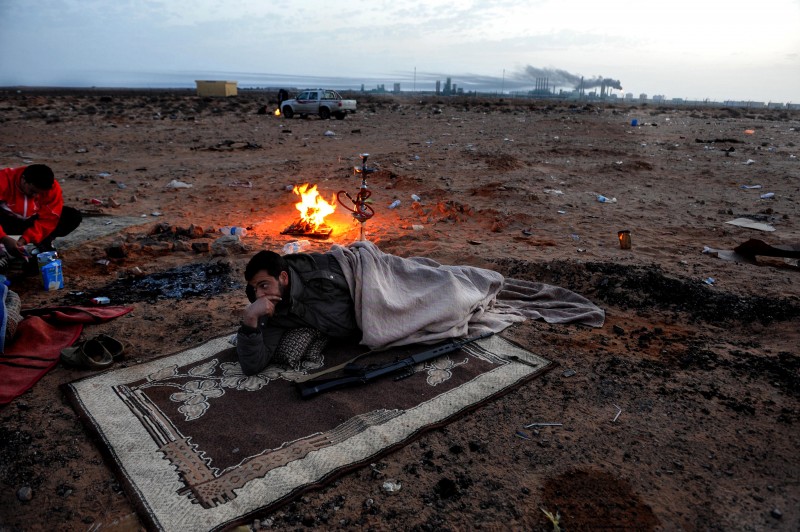 A Libyan rebel awakes at dawn, the morning following a harsh battle in Ras Lanuf. (29.03.2011, Ras Lanuf)
A Libyan rebel awakes at dawn, the morning following a harsh battle in Ras Lanuf. (29.03.2011, Ras Lanuf) 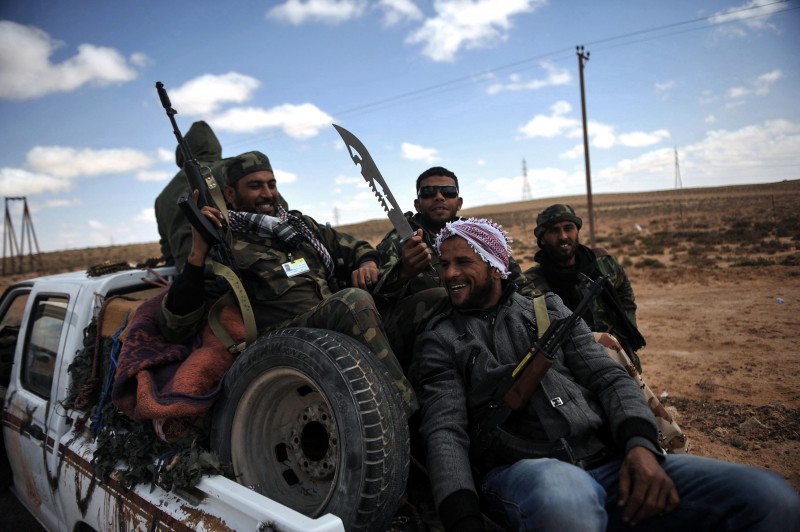 Rebels laughing and chanting ‘‘Gaddafi go, or we will cut your throat!’’ on their way from Ajdabiya to the frontline in Brega. (31.03.2011, Ajdabiya)
Rebels laughing and chanting ‘‘Gaddafi go, or we will cut your throat!’’ on their way from Ajdabiya to the frontline in Brega. (31.03.2011, Ajdabiya) 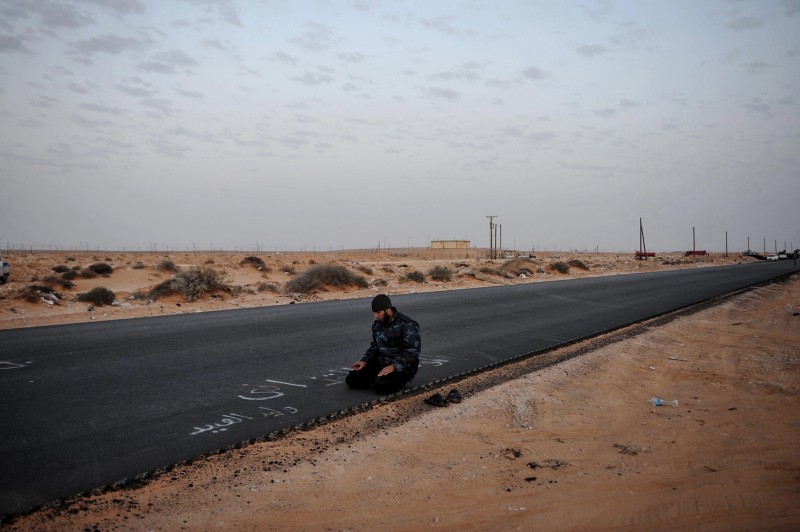 Morning prayer before a long day on the Libyan frontline. (29.03.2011, bin Jawad)
Morning prayer before a long day on the Libyan frontline. (29.03.2011, bin Jawad) 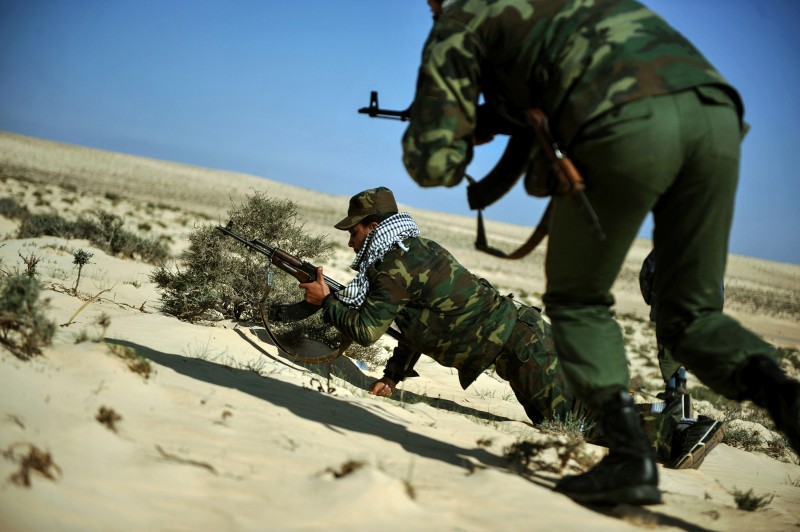 These rebels’ mission is to stay on the frontline and to open fire at any suspicious movement. (31.03.2011, Brega)
These rebels’ mission is to stay on the frontline and to open fire at any suspicious movement. (31.03.2011, Brega)  Mortar shells sometimes fall very close to rebel fighters. (31.03.2011, Brega)
Mortar shells sometimes fall very close to rebel fighters. (31.03.2011, Brega) 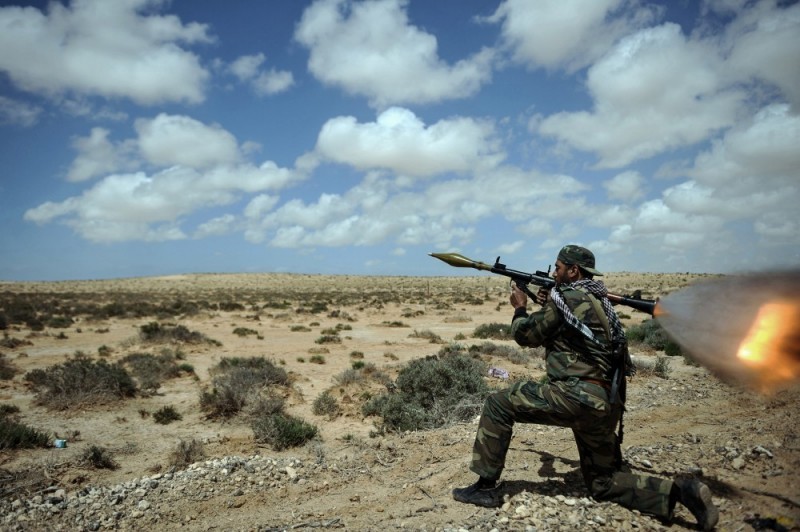 A rebel fires at Gaddafi forces’ tanks with his RPG-7, a rocket-propelled grenade launcher. (31.03.2011, Brega)
A rebel fires at Gaddafi forces’ tanks with his RPG-7, a rocket-propelled grenade launcher. (31.03.2011, Brega) 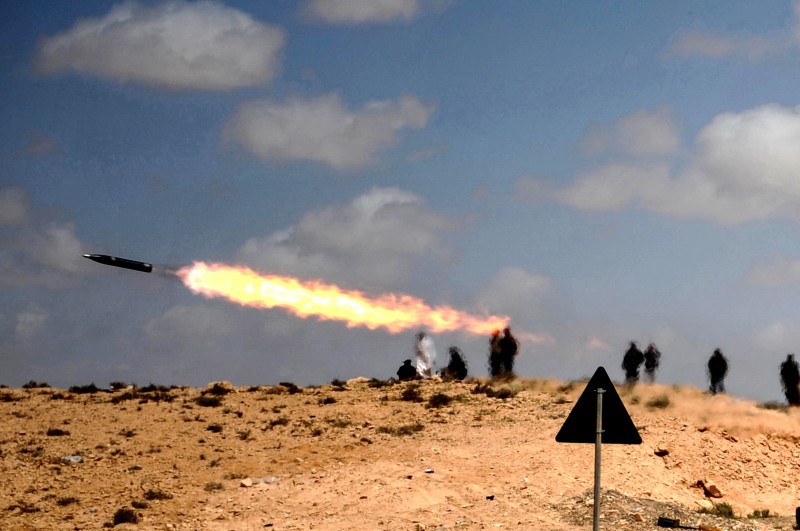 Rebels fire Grad rockets at Gaddafi forces (31.03.2011, Brega)
Rebels fire Grad rockets at Gaddafi forces (31.03.2011, Brega)  Rebels running away from Gaddafi forces’ mortar and artillery rounds. Libyan rebels favor pick-up trucks for their mobility and strong engine in the Libyan desert. (31.03.2011, Brega)
Rebels running away from Gaddafi forces’ mortar and artillery rounds. Libyan rebels favor pick-up trucks for their mobility and strong engine in the Libyan desert. (31.03.2011, Brega) 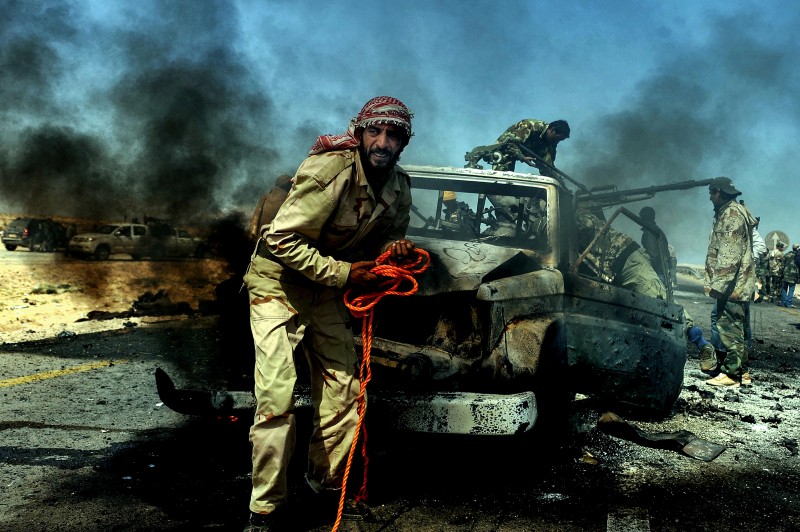 A NATO air strike near Brega accidentally hit one of the rebels’ pick-up trucks. Fifteen rebels died in the attack. (05.04.2011, Brega)
A NATO air strike near Brega accidentally hit one of the rebels’ pick-up trucks. Fifteen rebels died in the attack. (05.04.2011, Brega) 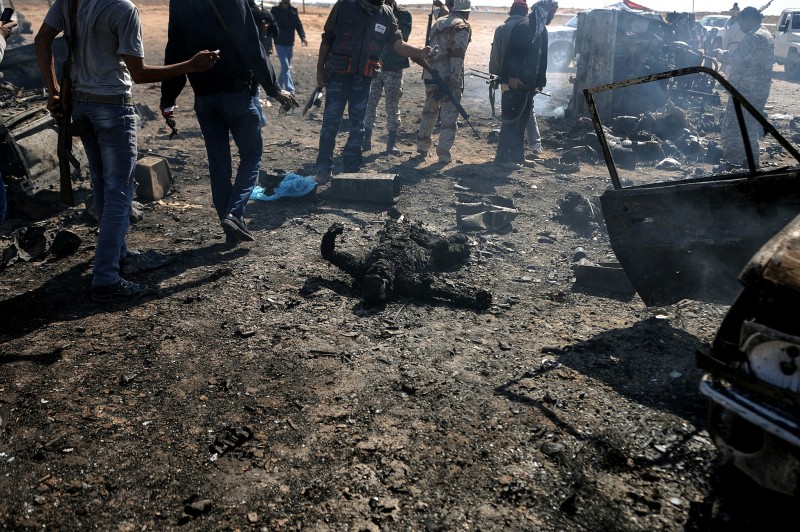 Every time NATO forces bomb Gaddafi soldiers, rebels send “cleaning teams” to make sure all the men died in the attack. They capture those who are still alive. (10.04.2011, Ajdabiya)
Every time NATO forces bomb Gaddafi soldiers, rebels send “cleaning teams” to make sure all the men died in the attack. They capture those who are still alive. (10.04.2011, Ajdabiya) 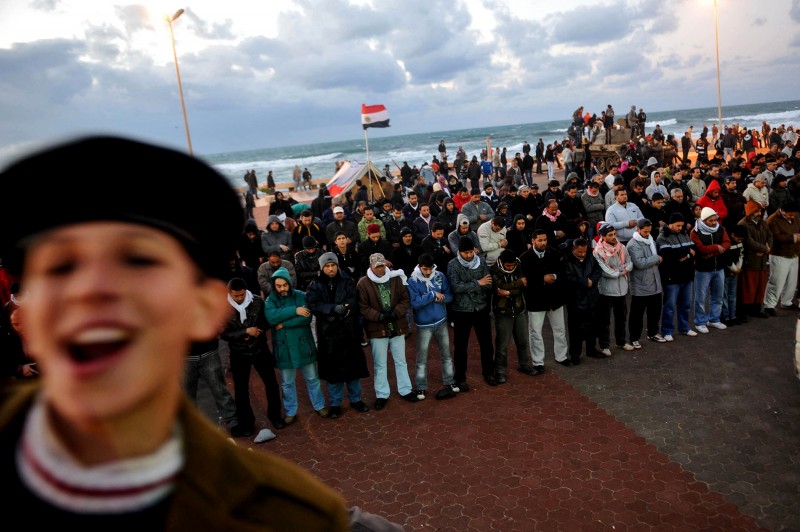 Funerals of Libyan rebels who lost their lives in the first battle of Benghazi. (27.02.2011, Benghazi)
Funerals of Libyan rebels who lost their lives in the first battle of Benghazi. (27.02.2011, Benghazi) 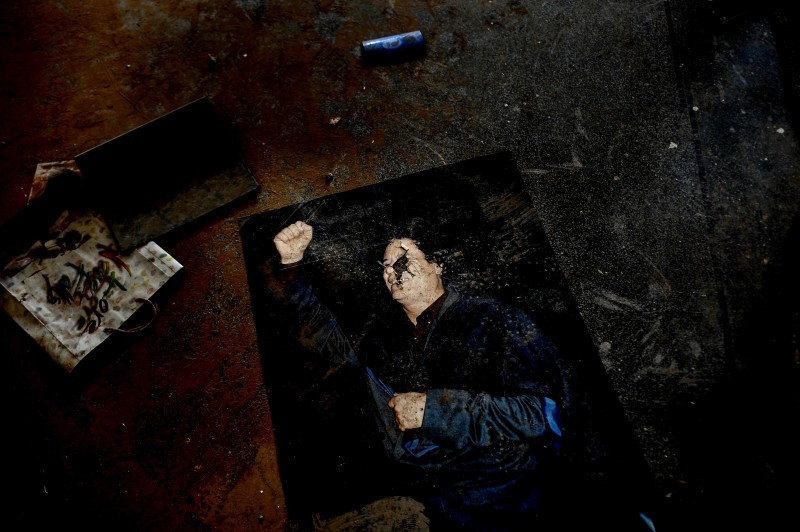 Portrait of Muammar Gaddafi on the floor of a courtroom in Benghazi.
Portrait of Muammar Gaddafi on the floor of a courtroom in Benghazi. 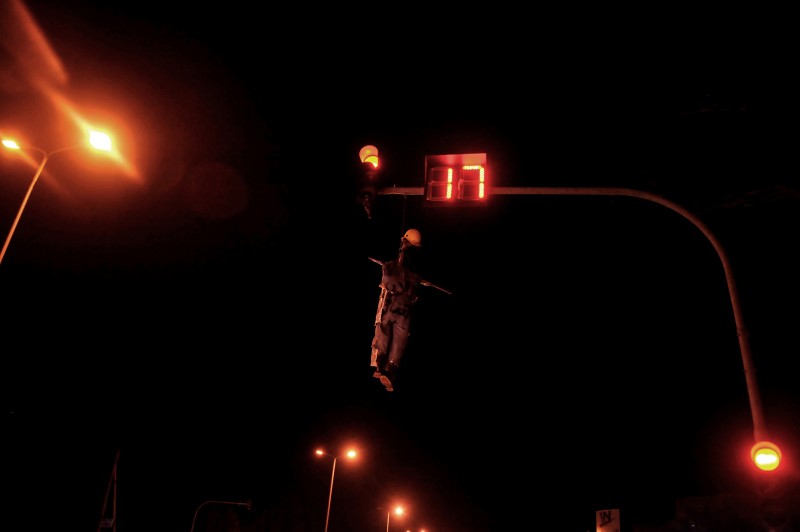 A model hanging from a red light in Benghazi.
A model hanging from a red light in Benghazi. 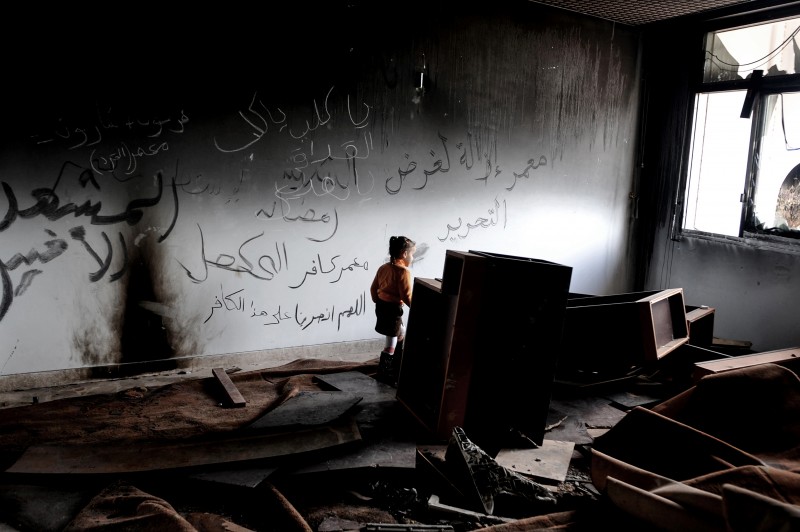 A little girl wanders around a building in Benghazi where dissidents used to be held and tortured by Muammar Gaddafi’s security forces. (27.02.2011, Benghazi)
A little girl wanders around a building in Benghazi where dissidents used to be held and tortured by Muammar Gaddafi’s security forces. (27.02.2011, Benghazi) 